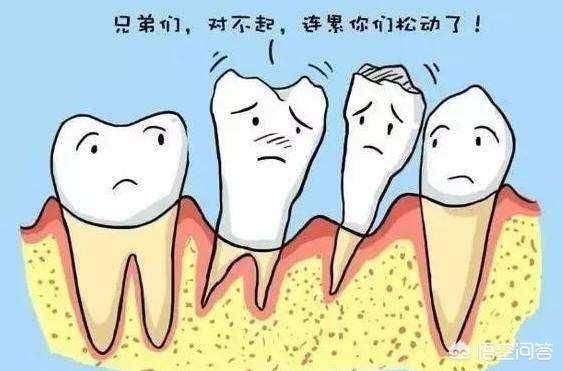Diabetes can also affect your oral health, so how can you protect it?
The main oral problem caused by diabetics is periodontitis, which is the main cause of tooth loss or extraction, and it is no exaggeration to say that periodontitis is the sixth most common complication of diabetes.
Diabetics with poor blood sugar control are prone to periodontitis because our periodontal tissues are less able to defend themselves against bacteria. Studies have shown that people with diabetes have three times the risk of developing periodontitis than those without diabetes. Moreover, periodontitis can also affect diabetics' blood sugar control, thus increasing the risk of cardiovascular disease. Therefore, people with diabetes need to pay more attention to their oral health problems.

How can diabetics protect their oral health?
1. Control blood sugar.For diabetic patients, controlling their blood sugar is the prerequisite for preventing and controlling all complications, if blood sugar is not well controlled, then nothing else needs to be said. Generally speaking, fasting blood glucose is required to be controlled below 7mmol/L, postprandial blood glucose below 10mmol/L (8mmol/L for young patients), and glycated hemoglobin below 7%.
2. Focus on oral hygiene to prevent infection.If there are irritants such as calculus and food residues, remove them in time to keep the oral environment clean, so it is recommended that you rinse your mouth with water after every meal. If necessary, you can do dental care, gum massage and so on.
3. Regular medical check-ups.Generally speaking, diabetics should have a physical examination of their mouth at least 2 times a year, but if there are red, swollen, bleeding gums, loose teeth, etc., they need to go to the hospital stomatology department for examination in time.
I am Dr. Yang Hao, specializing in the diagnosis and treatment of common and multiple diseases, chronic disease management, and health science. For more medical knowledge, please follow @DoctorYangHao.
Diabetic patients, their own body immunity is reduced, due to abnormal sugar metabolism, the body has wounds, not easy to heal, easy to get infected.
So it is vital to maintain oral hygiene. First of all, we should brush our teeth carefully every day, morning and evening, each time brushing for at least three minutes, effectively removing bacteria in the mouth, usually, you can also use some mouthwash for gargling, can effectively keep the mouth clean and hygienic.
The oral cavity should be examined every six months, and any caries should be treated early. Don't wait until you are in pain to get treatment because it is not easy for diabetic patients to reduce inflammation once their teeth have pulpitis or apical inflammation symptoms.
Therefore, when caries is found, it should be treated early, so that the treatment process is not painful, does not incur guilt, and spends less money.
If you need to have a tooth extracted, keep your blood sugar under control, under 8.88, and take oral anti-inflammatory medication for a week before the extraction, and for a week after the extraction, as a prophylactic against sexually transmitted infections.
If you have a full denture in your mouth, you need to use toothpaste to clean your denture every morning and evening to keep it clean and prevent Candida albicans infection. You can buy denture effervescent tablets to sterilize the denture.
1, the first is to control the underlying disease (primary disease) - strict control of blood glucose, as far as possible to make blood glucose below 8.0 mmol / L, at the same time antibacterial anti-inflammatory.
2, then pay attention to oral hygiene, clean teeth on time, rinse periodontal pockets, morning and evening brushing to straight brush, the best use of electric (vibration) toothbrush, rinse your mouth after meals, in order to reduce bacterial growth.
3, Mouthwash has some antibacterial effect on periodontitis, while soda can correct the weakly acidic environment of the diabetic mouth.
4. For those who use dentures, they should remove them after meals, rinse their mouths and rinse their dentures. At night before going to bed to take out the dentures, soaking all night, the next day with water to rinse the denture soaking agent, before you can put back on.
5, once a year to do a specialist dental examination, timely removal of dental calculus, once found to have oral disease should be treated as soon as possible.
thank you for your invitation
Diabetic patients are more likely to suffer from oral diseases than the general population, and the probability of developing severe refractory periodontitis is two to three times higher than that of the general population. Periodontitis is one of the most common oral diseases, according to statistics, the probability of periodontitis among diabetic patients is as high as 59.6%, and the longer the duration of the disease, the greater the chance of periodontitis.
Sugar lovers in the control of blood sugar at the same time must also pay attention to good oral health care: every 3 to 6 months to the stomatology department to do a checkup, when has occurred periodontitis, must actively ask a professional dentist for treatment, and inform the doctor that they have diabetes.
Brush your teeth diligently, at least twice a day (in the morning and before going to bed), with a soft-bristled toothbrush, and replace the toothbrush every 3 to 4 months. When brushing, tilt the toothbrush and gum line to a 45-degree angle, gently brush up and down, but also brush the chewing surface as well as the tongue. Rinse your mouth after each meal, and use dental floss to thoroughly remove debris and bacteria from between your teeth to ensure oral hygiene can effectively control the occurrence of inflammation.
This question and answer are from the site users, does not represent the position of the site, such as infringement, please contact the administrator to delete.